Do you struggle with math, despite your best efforts? You’re not alone. Millions of people worldwide face math anxiety. This mental block can stop you from doing well in school and work.
But what if we told you that you can beat this? You can overcome math anxiety. Get ready for a journey to conquer your fear of numbers and shine in math.
Key Takeaways
- Understand the root causes of math anxiety to address them effectively.
- Develop a growth mindset to cultivate a positive attitude towards mathematics.
- Practice mindfulness and relaxation techniques to manage stress and anxiety.
- Adopt effective study habits and problem-solving strategies to build confidence.
- Seek support and guidance from experts to overcome math anxiety for good.
Understanding the Root Causes of Math Anxiety
Exploring why people get anxious about math can help a lot. Two big reasons are bad past experiences and not feeling sure about math skills.
Negative Past Experiences
Many people’s math anxiety comes from bad times with math before. Maybe they had trouble with a concept or felt embarrassed in class. These moments can make math seem scary or unappealing. It’s important to deal with these bad memories to move past math anxiety.
Lack of Confidence
Not feeling good about math skills is another big reason for math anxiety. When students doubt themselves, they might feel too scared to try math. This fear can make them stay away from math, which makes them think they can’t do well in it.
Knowing why math anxiety happens helps people find ways to beat it. They can start to feel better about math.

“The first step towards overcoming math anxiety is to recognize and address the underlying factors that contribute to it.”
Top 5 Strategies to Overcome Math Anxiety
Beating math anxiety is a journey. It needs a mix of strategies. Here are the top five ways to face your fear and anxiety towards math:
- Develop a Growth Mindset: Think your math skills can grow. Believe you can get better with effort. See challenges as chances to learn, not threats.
- Practice Mindfulness and Relaxation Techniques: Try deep breathing and visualization. These calm your mind and body when you’re doing math. They help you focus.
- Build Effective Study Habits: Break down big math problems into smaller steps. Use real-life examples to understand math better.
- Seek Support and Guidance: Talk to math tutors, teachers, or groups. Working with others can give you new ideas to beat math anxiety.
- Explore Cognitive Behavioral Therapy (CBT): Get help from a mental health expert. They can help you change negative thoughts about math. CBT makes you think more positively.
Use these top five strategies to improve your math skills. It’s a journey, but it’s worth it. You’ll feel more confident and ready for math.

Beating math anxiety is possible. With the right mindset and strategies, you can do it. Try these top five methods and see your math skills and confidence grow.
Build a Growth Mindset
Getting a growth mindset is key to beating math anxiety and getting better at math. A growth mindset means you think you can get better with hard work and trying again. This is different from a fixed mindset, where you think you can’t change.
Having a growth mindset for math really helps. When you think you can get better at math with practice, you try harder. You see challenges as chances to learn, not as failures.
- Remember, math skills grow with time and effort.
- See challenges as ways to learn, not as threats.
- Focus on learning, not just the final result.
- Be proud of your progress, no matter what.
- Use feedback to get better, not to feel bad.
By having a growth mindset for math, you can overcome negative thoughts. This change helps you do better in math and feel more confident when facing math problems.
“The growth mindset is based on the belief that your basic qualities are things you can cultivate through your efforts. Although people may differ in every which way — in their initial talents and aptitudes, interests, or temperaments — everyone can change and grow through application and experience.”
Practice Mindfulness and Relaxation Techniques
Overcoming math anxiety needs a mix of methods. Mindfulness and relaxation help a lot. They make it easier to handle math stress and anxiety.
Deep Breathing Exercises
Deep breathing is great for math anxiety. Slow, deep breaths calm the body and mind. It’s good before math tasks to reduce tension.
Visualization Techniques
Seeing a calm scene or success in math helps too. It boosts confidence and fights off negative thoughts. This makes math less scary.
Using these techniques in math learning helps a lot. It makes you feel more in control and confident. This can improve your math skills and make math more enjoyable.
“Mindfulness is not about trying to change or fix anything, but rather about cultivating an accepting, non-judgmental awareness of the present moment.” – Jon Kabat-Zinn
Develop Effective Study Habits
To beat math anxiety, you need good study habits. Break down hard math problems into easy steps. Practice with real-life examples to feel more confident and skilled.
Break Down Complex Problems
Mastering math means breaking down big problems into smaller ones. This makes it easier to understand and not feel too scared. By focusing on one step at a time, solving problems becomes less scary and more clear.
Practice with Realistic Examples
Practicing with real examples is key. Don’t just use textbook problems. Look for ones that are like what you’ll see in real life. This makes your skills better and helps you remember what you’ve learned.
| Math Study Strategies | Benefits |
|---|---|
| Break down complex problems | Improves understanding of underlying concepts and makes the problem-solving process more manageable |
| Practice with realistic examples | Develops problem-solving skills and reinforces understanding of the material in real-life contexts |
“The key to mastering math is to break down complex problems and practice with realistic examples. This approach helps build confidence and competence in the subject.”
Using these strategies, students can beat their math anxiety. With hard work and a positive attitude, they can do well in math.
Seek Support and Guidance
Don’t face math anxiety alone. Getting help can change your life. Teachers, tutors, or math coaches can give you the tools you need.
Teachers know how to teach you in a way that works best. They make math easy to understand. Tutors or math coaches give you one-on-one help, making it even better.
- Collaborate with teachers to identify effective teaching strategies
- Work with tutors or math coaches for personalized guidance and support
- Develop a growth mindset and embrace the process of learning
Looking for help is brave. It shows you want to learn and get better. With the right help, you can beat math anxiety and do great in math.
“With the right support and guidance, anyone can learn and excel in mathematics.” – Dr. Maria Sanchez, Math Education Specialist
Start looking for support and watch your math anxiety fade away. You’ll become confident and skilled in math. Unlock your true potential and succeed in math.
Cognitive Behavioral Therapy for Math Anxiety
Cognitive Behavioral Therapy (CBT) is a great way to help people with math anxiety. It helps them change their negative thoughts and beliefs. This can make math easier and less scary.
Identifying Negative Thought Patterns
CBT starts by finding and changing bad thoughts about math. Thoughts like “I’m not good at math” can make things worse. By facing these thoughts, people can start to see them as not true.
Replacing Irrational Beliefs
CBT also helps change bad beliefs into good ones. For example, believing you can’t do math is not true. CBT helps people see their strengths and grow in math.
